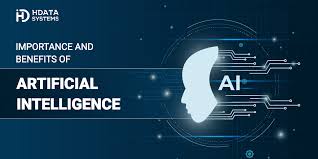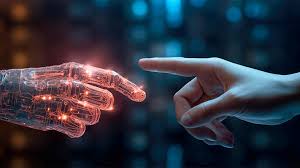
What is Artificial Intelligence?
Artificial intelligence apply to the simulation of human intelligence processes through machines, particularly computer systems. These processes include learning, which requires acquiring information and rules for using it, reasoning, which uses rules to reach approximate or definite conclusions and self-correction.
AI encompasses different areas like as machine learning , where machines improve at tasks with experience, natural language processing, which allows machines to understand and respond to human language, computer vision, enabling machines to interpret visual data and robotics, which requires designing robots to perform tasks traditionally done by humans.
AI systems are widely used across industries for applications like speech recognition, decision-making and language translation.
History of AI
History of artificial intelligence 9AI) dates back to ancient times, with early myths and stories about mechanical starts capable of thinking and acting like humans.
In 1956, the term “AI” was coined during the Dartmouth Conference, which is considered the birth of artificial intelligence research. Marvin Minsky, a cognitive scientist, was upbeat about the potential of the technology. During the “AI winter” years of 1974-1980, Government funding in the field decreased, when numerous criticized the pace of advancement.
The 1990s brings a shift to machine learning, emphasizing data-driven approaches. The 2010 marked the deep learning revolution, importantly advancing artificial intelligence such as image recognition and natural language processing.
Today’s artificial intelligence continues to evolve, impacting different industries and sparking discussions on ethical considerations and its future role in society.

Why is Artificial Intelligence (AI) important in 2025?
There are various way’s of AI, where artificial intelligence is important, In 2025 AI is crucial due to its transformation impact on different aspects of society and the economy.
Here are key aspects of AI in 2025:
- Automation: AI increase efficiency through automating repetitive tasks, freeing up human workers for more critical and complex creative work.
- Healthcare Innovation: Artificial Intelligence contributes to advanced diagnostics, personalized medicine and robotic surgeries improving patient’s care and outcomes.
- Climate Change Mitigation: Artificial Intelligence optimizes energy usage and supports research in sustainable technologies and helping combat climate changing.
- Productivity Increasement: AI increases productivity across industries through streamlining processes and improving decision-making.
- Inclusivity and Accessibility: Artificial intelligence (AI) powered tools gives solutions for people with disabilities, increasing their indecency and participation in different activates.
- Economic Growth: AI drives technological progress and innovation, contributing importantly to economic growth and competitiveness.
Artificial intelligence crucial in 2025 lies in its broad applications across industries, contributing to societal progress and economic advancement. However, when we search for Artificial intelligence why its important? after finding various negative aspects of AI. So, you will not worry about those types of negative aspects. AI is crucial and definitely will helpful and also change the future to different aspects.
What Makes Artificial Intelligence Technology So Useful?
Artificial intelligence solution are already being applied in virtually every fields with outstanding results.
Below is a comprehensive detail on what makes AI technology so useful:
- Efficiency and Automation
Artificial intelligence automates repetitive and mundane tasks, enhancing efficiency and allowing human workers to focus on more strategic and creative work. This involves to important time and cost saving in different industries.
- Data Analysis
AI can analyze and process widely amounts of data much faster and more accurately than humans. This identifies patterns, trends and insights which help in creating informed decisions and improving strategies across sectors.
- Personalization
Artificial intelligence enable widely personalized experience in areas such as marketing, customer service and healthcare. This tailors recommendation, treatments, treatments and interactions based on individual performances and needs increasing user satisfaction.
- Accuracy Improvement
Artificial Intelligence systems often outperform humans in tasks involving precision, like as medical diagnoses, financial modeling and quality control in manufacturing, leading to better outcomes and fewer errors.
- Healthcare
AI contributes to advanced diagnostics, personalized medicine and robotic surgeries improving patient’s care and outcomes. Healthcare systems is improved by following and monitoring patients in real time and knowledge about every patient’s lifestyle.
Artificial Intelligence (AI) is significant because of its increase productivity, accuracy and scalability while giving complex insights and automation across different domains.
Artificial Intelligence (AI) Trends to Expect
Below are some key artificial intelligence trends to expect in the future:
- AI Generative: Artificial Intelligence models enable of creating content, like as text, images and music, are expected to pre-future. AI tools such as GPT-3, DALL-E and other generative models will become more refined, allowing businesses and individuals to generate good quality content with ease.
- Healthcare AI: AI part in healthcare will continue to increase, with applications such a precision medicine, AI-driven diagnostics, personalized treatments and drug discovery. Artificial intelligence will help improve patient outcomes, decrease healthcare costs and enabling more efficient clinical practices.
- AI Ethics: Artificial intelligence technology becomes more widespread, there will be a growing focus on ethical consideration, regulation and transparency. Governments and organizations will work on growing guidelines to make sure the responsible development and deployment of artificial intelligence system.
- Cybersecurity AI: Artificial intelligence will be leveraged to detect and inform to security breaches in real-time , with the rise of cyber threats. Artificial intelligence-powered system will help in identifying vulnerabilities, preventing attack and increasing cybersecurity defenses.
- AI Virtual Assistant: Virtual assistance will become more intelligent and eligible of handling a huge range of tasks, from managing complex schedules to offering tailored advice. Both personally and professionally, these AI assistants will become integral parts of daily life,
- AI in Autonomous Vehicles: With self-driving technology will continue to evolve, through AI being used for better decision-making, safety features and more efficient driving. The align of AI in transportation system will bring about smarter and more sustainable travel choices.
Above mentioned all trends highlight the exploring the role of artificial intelligence in transforming industries, services improving and making new opportunities for innovation and efficiency.
Conclusion
AI is a transformative force that continues to evolve and reshape different aspects of society and industry. Its ability to automate tasks, gives personalized experiences and improve accuracy has created it invaluable across sectors such as healthcare, manufacturing, finance and customer service. AI future trends, like as generative AI, AI in cybersecurity and AI-driven healthcare benefits, indicate that AI will become even more integrated into our daily lives, increasing efficiency and innovation.
Widely spreading AI-powered virtual assistants and the integration of Artificial Intelligence with edge computing will facilitate faster, localized decision-making processes, important for industries that involve real-time data processing. Advancements in natural language processing will make AI more adept at understanding and interacting with humans, Moreover blurring the lines between human and machine interaction.
But, with the growing use of artificial intelligence, ethical concerns, transparency and regulatory frameworks will become increasingly crucial to make sure AI is developed and deployed responsibly. This balance between innovation and regulation will be important in harnessing AI full protentional with mitigation time.
In conclusion, artificial intelligence (AI) is not just a technological trend but a fundamental shift in how industries operate live, offering huge opportunities for growth, efficiency and problem-solving, while also necessitating careful oversight and ethical consideration.
FAQs
Where is AI technology being applied?
AI technology is being applied across a wide range of sectors and industries.
- AI is used for diagnostics, in healthcare field also in robotic surgeries and during discovery.
- AI in finance field help with fraud detection and algorithmic trading. AI in retail industry is personalized recommendations, inventory and customer services management helps.
- In autonomous vehicles, AI also integral for increasing safety and navigation systems. Artificial Intelligence in manufacturing use for, optimizes supply chain, predicts equipment failures and also improves quality control.
- Moreover, Artificial Intelligence plays a important role in cybersecurity, natural language processing for personal assistants and also content creating in the media and entertainment industry.
How to launch a career in AI?
Can i get my AI degree online?
Why should i pick CSU Global AI program?
what will AI look like in 2025?
why is AI needed?
How can Artificial Intelligence change the world?
what are 5 facts about AI?
Below are 5 facts about Artificial Intelligence:
- AI can minimum human abilities
- AI is Everywhere
- AI can drive automation
- AI advantage in regulatory challenges and Ethical
- AI is based on Machine Learning
Who is the father of AI ?
John McCarthy is the father of Artificial Intelligence (AI). He coined the term “artificial intelligence” in 1956 and was a prominent figure in the field, contribution important to its early development.
In 1956, the term “AI” was coined during the Dartmouth Conference, which is considered the birth of artificial intelligence research. Marvin Minsky, a cognitive scientist, was upbeat about the potential of the technology. During the “AI winter” years of 1974-1980, Government funding in the field decreased, when numerous criticized the pace of advancement.





